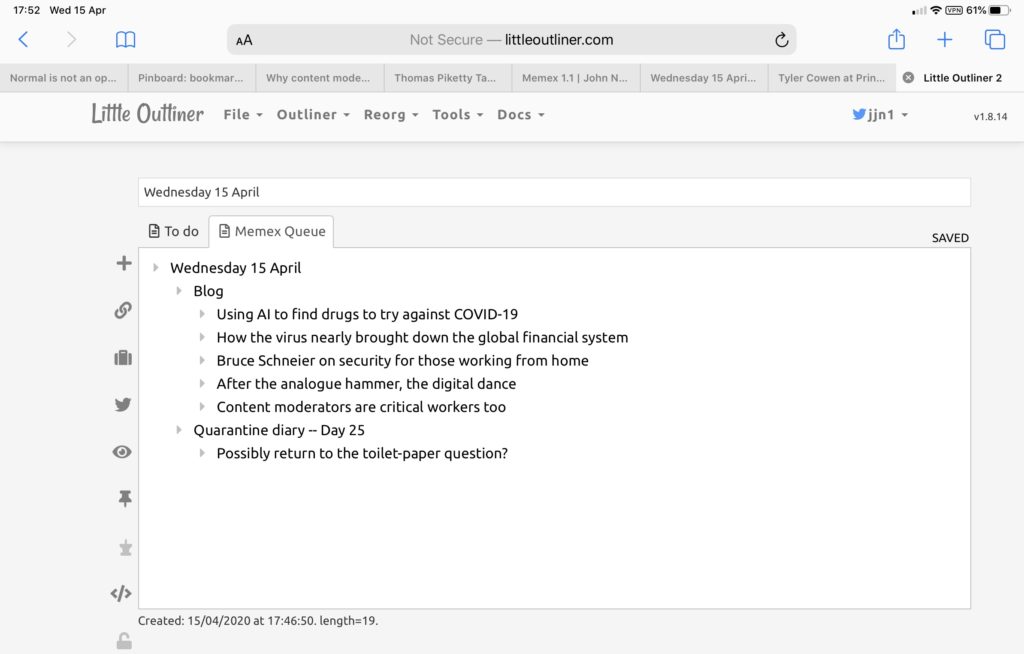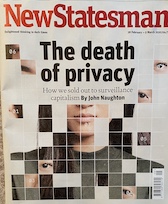Quote of the Day
“Neoliberalism shrinks public budgets; solutionism shrinks public imagination. The solutionist mandate is to convince the public that the only legitimate use of digital technologies is to disrupt and revolutionise everything but the central institution of modern life – the market.”
Tools for blogging
Someone asked me the other day how I plan the content of this blog. Answer: I use the wonderful Little Outliner created by Dave Winer. It’s everything a tool should be — lightweight, always-on (it runs in the browser) and agile. Here’s a screenshot of yesterday’s plan.
Dave was the author of the first great outliner — ThinkTank for the Apple Macintosh. I still remember the first day I saw it. And I used it — and its successors — ever since.
An outliner is really a tool for thinking with. One of the great ideas Microsoft had when creating PowerPoint was to build into it an ‘outliner’ mode which allowed one to focus on the flow of the argument rather than fiddling with the slides.
When the world stopped
When The World Stopped from Michael S Cohen on Vimeo.
Nice idea: a photographer grabbed images from webcams all over the world, digitally enhanced them and made an eerily compulsive film.
The tech ‘solutions’ for coronavirus take the surveillance state to the next level
Sobering and perceptive essay by Evgeny Morozov. He’s long been a critic of a particular Silicon Valley ideology — “solutionism” — the belief that for every problem, social or otherwise, there is a tech solution. But solutionism has transcended
its origins in Silicon Valley and now shapes the thinking of our ruling elites. In its simplest form, it holds that because there is no alternative (or time or funding), the best we can do is to apply digital plasters to the damage. Solutionists deploy technology to avoid politics; they advocate “post-ideological” measures that keep the wheels of global capitalism turning.
Morozov sees solutionism and neoliberalism as a sinister pair of ideological twins.
If neoliberalism is a proactive ideology, solutionism is a reactive one: it disarms, disables and discards any political alternatives. Neoliberalism shrinks public budgets; solutionism shrinks public imagination. The solutionist mandate is to convince the public that the only legitimate use of digital technologies is to disrupt and revolutionise everything but the central institution of modern life – the market.
Great essay. Worth reading in full.
Why does it suddenly feel like 1999 on the Internet again?
From Tech Review:
You see it in the rekindling of old relationships. Before sentimentality was replaced by an annual Facebook friends spring cleaning, it was a treat to keep in touch with middle school classmates and rediscover primary school teachers. Now we’re back to cherishing faraway old friends; after all, there’s no longer much difference between hanging out with them and those closer to home. People are going analog, too: sending postcards, leaving voicemail messages for family, putting together care packages.
The internet also used to be a place where you could learn about anything—that is, until the information overload became overwhelming. Now cabin fever and boredom have led people back to the internet to learn again, crowdsourcing the best sourdough recipe, mastering new languages, or picking up any number of other useless or handy skills.
Even Millennial-dominated apps have become more fun, less filtered, like the days before Photoshop and AI-powered touch-ups made us more vain about our digital appearance. The glossiness that pervaded Instagram the past few years has crumbled. Now there’s a delightful rawness to virtual yoga sessions done in cluttered living rooms, Martha Stewart and Ina Garten sharing their culinary tips from unflattering angles, even celebrities chiding their mother-in-law for being too loud.
Nice piece, but it will only make sense to those of us who were early users of the Net. 1999 was the year before the first Internet bubble burst. Google and Blogging were still new. And Facebook wasn’t even a glint in an eye.
And, as Andrew Sullivan of the Internet Society points out, in 1999 the Internet was much smaller. Also, many people still accessed it via dial-up lines, which meant that it could be expensive scrolling through endless messages etc.
Nostalgia isn’t what it used to be.
Quarantine diary — Day 26
This blog is now also available as a once-a-day email. If you think this might work better for you why not subscribe here? (It’s free and there’s a 1-click unsubscribe if you subsequently decide you need to prune your inbox!) One email a day, in your inbox at 07:00 every morning.





